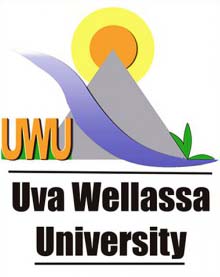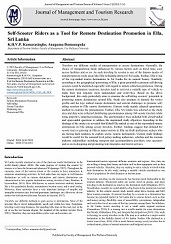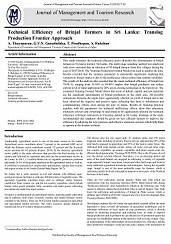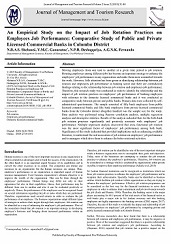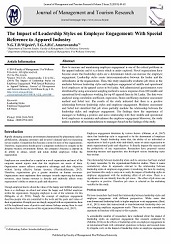Volume 02, Issue 02
TABLE OF CONTENTS
01.Self-Scooter Riders as a Tool for Remote Destination Promotion in Ella, Sri Lanka
K.H.V.P. Kumarasinghe, Anupama Damunupola Department of Tourism Studies, Faculty of Management, Uva Wellassa University
INFORMATION
Journal Title: Journal of Management and Tourism Research
Volume : 2
Issue : 2
Page : 1-16
Submitted: October 02, 2019; Revised: November 17, 2019; Accepted: December 23, 2019
Correspondence : anupama.uksl@gmail.com
ABSTRACT
Travelers use different modes of transportation to access destinations. Generally, the choice of transportation mode influenced by various factors such as travel time, cost, access facilities and so on. As such traveling by scooter is one of the famous modes of transportation in rocky areas like Ella in Badulla district of Sri Lanka. Further, Ella is one of the top-ranked tourist destinations in Sri Lanka for its natural beauty. Similarly, according to the geographical positioning of Ella, a great potential to promote self-driving scooters could be identified especially with regard to remote attraction promotion. During the remote destination vacations, travelers tend to rent out a suitable type of vehicle to make their tour itinerary more independent and worry-free. Based on the above background, this study particularly aims to examine the self-riding scooters’ potentials in promoting remote destinations around Ella. Study also attempts to identify the visitor profile and the top- ranked remote destination and current challenges to promote self-riding scooters in Ella remote destinations. Current study mainly adopted quantitative method to examine the phenomenon. Further, Ella, Sri Lanka was selected as the study area and data were collected distributing questionnaires among 160 scooty travelers while using purposive sampling technique. The questionnaires were included both closed-ended and open-ended questions to address the mentioned study objectives According to the findings of the study it is revealed that Kithal Ella ranked as one of the top-ranked remote destinations in Ella among scooty travelers. Further, findings suggest that demand for scooty tours is growing in Ella as many tourists in Ella are thrill and leisure seekers who are having high tendency to explore exotic, remote destinations. Current study findings would be useful for the national level policy making authorities, scholars and the tourism industry stakeholders including transport and accommodation providers, tour operators and so on in designing and promoting tour itineraries and tourist services.
Keywords: Human Resource Management practices, Small and medium enterprises, Manufacturing Small and medium enterprises, Business performance, Sri Lanka.
Keywords: Remote Destination Promotion, Self-riding, Scooty Travelers, Marketing mix, Promotional Mix
02. Technical Efficiency of Brinjal Farmers in Sri Lanka: Translog Production Frontier Approach
A. Thayaparan, G.Y.N. Gunathilaka, T. Pirathepan, A. Rukshan Department of Economics and Management, Vavuniya Campus of the University of Jaffna
INFORMATION
Journal Title: Journal of Management and Tourism Research
Volume : 2
Issue : 2
Page : 17-28
Submitted: October 03, 2019; Revised: November 01, 2019 ; Accepted: November 06, 2019
Correspondence : thayakwshu@gmil.com
ABSTRACT
This study estimates the technical efficiency and it identifies the determinants of brinjal farmers in Vavuniya district, Sri Lanka. The multi-stage sampling method was employed with cross sectional data in selection of 50 brinjal farmers from five villages during the year of 2017/2018. The Translog Production Frontier Model was used to analyse the data. Results revealed that the variance parameter is statistically significant; implying that variation in brinjal output is due to the inefficiency effects rather than random variability. The results of the analysis also revealed that the mean technical efficiency of brinjal was 79.98 %, ranging from 35.54% to 99.86% implies that brinjal producers can reduce current level of input application by 20% given existing technology at the farm level. The estimated Translog Frontier Model shows that costs of labour, capital, and raw materials are the significant determinants of brinjal production in the study area. All possible interactions between the inputs have significantly affected on yield of brinjal and it has been observed the negative and positive signs, reflecting that there is substitution and complementary effects exist among the pair of inputs. Results of Translog function together with the parameters for technical inefficiency effects show that education, extension services and ownership of land found to be significantly affected the technical efficiency of brinjal cultivation in Vavuniya district in Sri Lanka. Findings of the study recommended that emphasis should be given for less efficient farmers to improve the efficiency by adopting the new practices and effective extension services which help them to operate at the frontier in future.
Key words: Brinjal farmers, Technical efficiency, Translog production frontier model
3. An Empirical Study on the Impact of Job Rotation Practices on Employees Job Performance: Comparative Study of Public and Private Licensed Commercial Banks in Colombo District
N.B.A.S. Shehansi, Y.M.C. Gunaratne*, N.P.R. Deshappriya, A.G.N.K. Fernando
Department of Management Sciences, Faculty of Management, Uva Wellassa University
INFORMATION
Journal Title: Journal of Management and Tourism Research
Volume : 2
Issue : 2
Page : 29-38
Submitted: October 03, 2019; Revised: November 12, 2019 ; Accepted: December 23, 2019
Correspondence : nipuniferp93.nf@gmail.com
ABSTRACT
Moving employees from one task to another at a given time period is job rotation. Rotating employees among different jobs has become an important strategy to enhance the employees’ job performance in any organization and make them more committed towards the work. However, little attention has been given in identifying relationship between job rotation and employees job performance in banking sector and there are contradictory findings relating to the relationship between job rotation and employees job performance. Therefore, this research study was conducted in order to identify the relationship and the impact of job rotation practices on employees’ job performance of banking employees with reference to the domestic licensed commercial banks and it was conducted as comparative study between private and public banks. Primary data were collected by self-administered questionnaire. The sample consisted of fifty bank employees from public licensed commercial banks and fifty bank employees from private licensed commercial banks from the Colombo district altogether hundred was the sample size for the study. Data analysis was performed using Pearson correlation analysis, multiple regression analysis and descriptive statistics. Results of the analysis indicated that, for the both bank job rotation practices significantly and positively associate with employees’ job performance. Multiple regression analysis discovered that cross functional job rotation was the most significant factor of employees’ job performance among both bank. Significance of this study indicated that provided implications such as enhancing available literature, to understand the real association of job rotation on employees’ job performance and to managers which drive them to enhance the better rotational activities.
Keywords: Job rotation, Employees job performance, Domestic licensed commercial banks
4. The Impact of Leadership Styles on Employee Engagement: With Special Reference to Apparel Industry
N.G.T.D.Wijesiri1, T.G.A.H.C.Amarawansha*1 1 Department of Tourism Studies. Faculty of Management. Uva Wellassa University 1 Department of Management Sciences, Faculty of Management, Uva Wellassa University
INFORMATION
Journal Title: Journal of Management and Tourism Research
Volume : 2
Issue : 2
Page : 39-54
Submitted: November 02, 2018; Revised: December 09, 2019 ; Accepted: December 23, 2019
Correspondence : hirusha.chathuri@yahoo.com
ABSTRACT
How to increase and maintaining employee engagement is one of the critical problems in the apparel industry and it is a thesis which is under explored. Novel organizations have become aware that leadership styles are a determinant which can increase the employee engagement. Leadership styles create intercommunication between the leader and the subordinates in the organizations. Thus, this study empirically evaluates job stress as the mediator between leadership styles and employee engagement of middle and operational level employees in the apparel sector in Sri Lanka. Self-administered questionnaires were distributed by using convenient sampling method to secure responses from 100 middle and operational level employees working for top 05 apparel firms in Sri Lanka. The data were analyzed using correlation coefficient, regression, Baron and Kenny mediator assessment method and Sobal test. The results of the study indicated that there is a positive relationship between leadership styles and employee engagement. Mediator assessment and Sobal test identified that job stress partially mediate the relationship between the leadership styles and employee engagement. The findings show the importance of managers to building a positive and naive relationship with their middle and operational level employees to maintain and enhance the employee engagement Moreover, the study makes a number of recommendations to managers based on the findings of the study.
Keywords: Leadership Styles, Employee Engagement, Job Stress
5. A Study of Factors Influences on Self-Directed Learning of Undergraduates (With Special Reference to Sri Lankan Universities)
D.S. Munasinghe, J.Sutha*, K.J.T. Perera
Department of Management Sciences, Faculty of Management, Uva Wellassa University
INFORMATION
Journal Title: Journal of Management and Tourism Research
Volume : 2
Issue : 2
Page : 55-70
Submitted: Sep 25, 2019; Revised: Dec 18, 2019; Accepted: Dec, 31, 2019
Correspondence : jasulama@gmail.com
ABSTRACT
In 21st century, the ability to engage in self-directed learning (SDL) considered to be essential for university undergraduates to improve and frequently update their knowledge in modern world. The aim of this study is to identify the factors affecting for self-directed learning of university management undergraduates in Sri Lanka. In order to achieve the objective of the research, the study was conducted in qualitative research design. Thirty management undergraduates from five national universities were selected by using convenience sampling technique. The qualitative data were collected through semi structured interviews. The Thematic analysis technique was utilized for the analysis of interview transcripts with the support of NVivo 8 Qualitative Data Analysis software. This qualitative study came up with ten critical factors which effects positively and negatively for self-directed learning of management undergraduates in national universities. Those critical factors were language, interest to subjects/ topics, accessibility of resources, lecturing style and methods, friends’ and others’ support, time adequacy, student’s perception, student’s learning style, prior knowledge, student’s future goal. Based on the findings, those factors were affecting to undergraduates for engaging in Self-directed learning or preventing from self-directed learning. The result of this research is a significant source for the education policy makers to change university education system to enhance self-directed learning of the undergraduates. Results of this study provide qualitative data to enhance literature related to factors affecting self-directed learning of the undergraduates.
Keywords: Self-directed learning, Adult learning theory, Management undergraduates
6. Effect of Residents’ Perception towards Tourism Impacts on Intention to Involve in Tourism Development; Special Reference to Coastal Area in Negombo
Athapaththu A.M.A.S, Dahanayake S.N.S.*
Department of Tourism & Hospitality Management, Faculty of Management Studies, Rajarata University of Sri Lanka, Mihintale
INFORMATION
Journal Title: Journal of Management and Tourism Research
Volume : 2
Issue : 2
Page : 71-84
Submitted: Oct 01, 2019; Revised: Jan 07, 2020; Accepted: Jan, 09, 2020
Correspondence : shayon78@gmail.com
ABSTRACT
Generosity and cooperation of the residents is essential for the attainment and sustainability of tourism development goals in country. Moreover, the intention of residents to involve in tourism development lead to a solid foundation for a successful tourism industry in the country. The perception of local residents towards tourism impacts determines the success and failure of any tourism developmental project. Hence, this study attempts to investigate the influential impact of the residents’ perception towards tourism impacts and their intention to involve in tourism development. The perception of 200 randomly selected residents was surveyed employing a structured questionnaire, from 10 Grama Niladari divisions using stratified sampling technique, in Negombo coastal area which is one of the most attracted tourist destination with ample number of tourism developmental projects.The results of regression analysis reveal that the effect of residents’ perception towards economic impacts and environmental impacts are significantly influential on their intention to involve in tourism development while residents’ perception towards socio-cultural impacts does not effect on intention to involve in tourism development. Thus, the study recommends the respective authorities to take action to minimize the negative economic and environmental impacts while increasing the positive impacts that eventually leads an upsurge intention of residents to involve in tourism development.
Keywords: Tourism development, Residents’ involvement, Residents’ perception, Tourism impacts, Negombo coastal area

